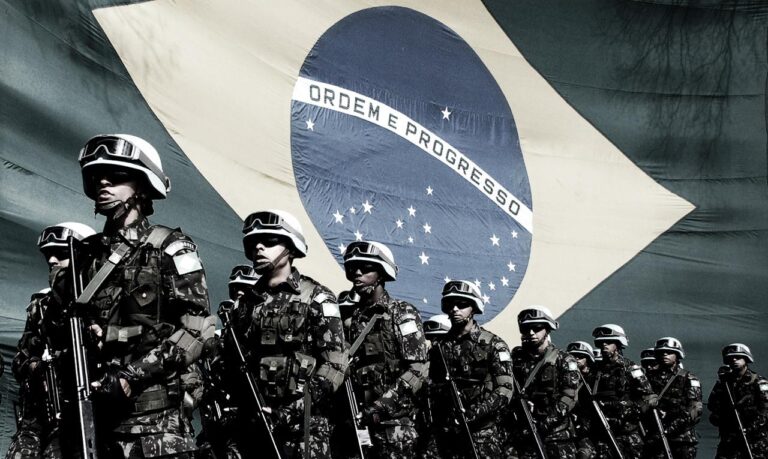The Brazilian Armed Forces are intensifying their preparations ahead of the upcoming BRICS summit set to take place in Rio de Janeiro. As the country gears up to host leaders from Brazil, Russia, India, China, and South Africa, military units are coordinating efforts to ensure security, logistical support, and smooth operational execution throughout the high-profile event. This strategic mobilization underscores Brazil’s commitment to providing a secure environment for one of the world’s most significant international forums.
Brazilian Armed Forces Enhance Security Protocols Ahead of BRICS Summit
In anticipation of the high-profile BRICS summit set to take place in Rio de Janeiro, the Brazilian Armed Forces have intensified their security measures with a focus on maintaining safety and order throughout the event. Specialized units have been deployed across the city, equipped with advanced surveillance technology and rapid response capabilities. Coordination between the Army, Navy, and Air Force has been enhanced to ensure seamless communication and operational efficiency during the multi-day gathering of international dignitaries. Key areas surrounding the summit venue are now under heightened surveillance, with strict access controls and regular patrols to deter any potential threats.
The security framework includes several critical components, such as:
- Integrated command centers that unify intelligence and on-ground operations
- Counterterrorism drills conducted in collaboration with federal agencies
- Advanced cybersecurity protocols to safeguard sensitive communications
- Extensive logistical planning for emergency medical support and evacuation routes
These measures are designed not only to protect the summit but also to minimize disruption to Rio’s residents and visitors. The Brazilian Armed Forces remain vigilant, adapting to evolving security challenges while fostering an environment conducive to productive international dialogue.
| Component | Primary Objective | Status |
|---|---|---|
| Surveillance Systems | Real-time monitoring | Operational |
| Mobile Rapid Response Units | Immediate threat neutralization | Deployed |
| Cybersecurity Division | Protect information networks | Active |
| Medical Emergency Teams | Immediate treatment and evacuation | On standby |
Strategic Coordination Between Military and Civil Agencies Ensures Comprehensive Preparedness
In an unprecedented display of unity, the Brazilian Armed Forces have intensified collaboration with various civil agencies to guarantee a secure environment for the upcoming BRICS summit. This multidimensional approach leverages the expertise of military strategists alongside municipal and federal security forces, enabling a seamless response to potential threats. Coordination meetings have focused heavily on integrating communication protocols, resource allocation, and real-time intelligence sharing, ensuring that all entities operate under a synchronized framework.
The operational blueprint encompasses diverse preventive and reactive measures, highlighting the significance of community involvement and infrastructural resilience. Key focus areas include:
- Joint training exercises involving military units and local police forces to simulate crisis scenarios.
- Deployment of advanced surveillance technology in strategic urban locations.
- Emergency response frameworks developed in partnership with civil defense and health services.
| Agency | Role | Key Contribution |
|---|---|---|
| Brazilian Army | Security & Perimeter Control | Rapid Deployment Forces |
| Federal Police | Intelligence & Counterterrorism | Surveillance & Investigation |
| Civil Defense | Disaster & Emergency Management | Evacuation Coordination |
| Health Ministry | Medical Support | Onsite Medical Response |
Recommendations for Strengthening Infrastructure and Emergency Response Capabilities During the Event
To ensure seamless operations during the BRICS summit, a multi-layered approach focusing on both physical and digital infrastructure is paramount. Bolstering communication networks with dedicated secure channels will facilitate swift coordination among military units, civil authorities, and emergency services. Additionally, reinforcing key transport arteries and access points with temporary checkpoints and surveillance systems will mitigate potential disruptions. Emphasis should be placed on the deployment of mobile command centers strategically stationed across Rio de Janeiro, providing real-time situational awareness and rapid decision-making capabilities throughout the event.
Enhancing emergency response preparedness demands robust collaboration between the Brazilian Armed Forces and local agencies. Regular joint drills simulating a wide array of potential scenarios – from natural disasters to security breaches – will increase response agility and inter-agency cohesion. Investments in specialized equipment, such as advanced rescue vehicles and medical support units, are critical to minimize casualties and maintain public safety. The table below summarizes key recommendations prioritized for effective infrastructure and emergency readiness during the summit:
| Area | Measure | Expected Outcome |
|---|---|---|
| Communication | Secure, encrypted radio networks | Continuous, undisturbed coordination |
| Transport | Enhanced checkpoints and surveillance | Controlled access, reduced traffic overload |
| Emergency Drills | Joint force scenario simulations | Improved response times and teamwork |
| Equipment | Deployment of specialized rescue units | Rapid casualty handling and support |
In Retrospect
As the BRICS summit approaches, the Brazilian Armed Forces remain steadfast in their commitment to ensuring a secure and efficient environment for the high-profile event. Their ongoing preparations underscore the strategic importance Brazil places on hosting this international gathering in Rio de Janeiro. With security measures advancing and coordination intensifying, the stage is set for a summit that balances diplomatic engagement with robust safety protocols. Observers will be watching closely as Brazil demonstrates its capability to manage complex security challenges on the global stage.




